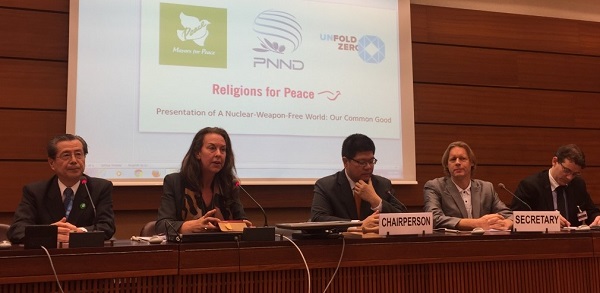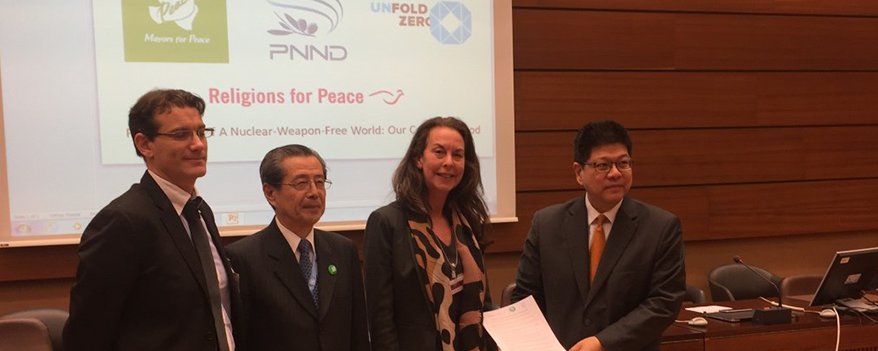Leaders of the major religious faiths and interfaith networks, joined forces with parliamentarians and mayors from around the world to call for nuclear abolition and to support the work of the UN Open Ended Working Group on Multilateral Nuclear Disarmament Negotiations (OEWG), a new UN disarmament body that started its work in Geneva this week.
In a joint statement A Nuclear-Weapon-Free World: Our Common Good presented today to the OEWG Chair Ambassador Thani Thongphakdi, representatives of Religions for Peace, Mayors for Peace and Parliamentarians for Nuclear Non-proliferation and Disarmament (PNND) called on governments at the OEWG to “commit to nuclear abolition, replace nuclear deterrence with shared security approaches to conflicts, and advance a nuclear weapons convention or framework of agreements that eliminate nuclear weapons.”

Yasuyoshi Komizo, Secretary-General of Mayors for Peace, noted that there are over 7000 member cities supporting the call for achievement of a nuclear weapons convention by 2020. Sarah Snyder, Director of Partnerships for Religions for Peace, highlighted principles common to all major religions that prohibit nuclear weapons. Jean-Marie Collin, PNND Coordinator for France, noted that parliamentarians from nuclear-armed States, ‘nuclear umbrella’ states and non-nuclear states had joined with mayors and religious leaders to support the nuclear abolition call.
Endorsers of the statement
The joint statement, which was adopted in Hiroshima on 6 August 2015 the 70th anniversary of the nuclear bombing of that city, has been endorsed by legislators and religious leaders from Australia, Austria, Bangladesh, Belgium, Brazil, Bulgaria, Cameroon, Canada, Costa Rica, Czech Republic, Democratic Republic of Congo, Denmark, Ecuador, Finland, France, Germany, Greece, Iceland, India, Indonesia, Ireland, Israel, Italy, Japan, Jordan, Kazakhstan, Malawi, Marshall Islands, Mauritania, Mexico, Monaco, Netherlands, New Zealand, Nigeria, Norway, Pakistan, Palestine, Portugal, Saudi Arabia, Scotland, South Africa, Spain, Sweden, Switzerland, Turkey, Uganda, United Kingdom, United States and Zimbabwe. (Statement also available in Arabic, French, German, Japanese, Portuguese, Russian and Spanish.
Roles of parliamentarians, mayors and religious leaders
Ambassador Thongphakdi commended the partnership between Religions for Peace, Mayors for Peace and Parliamentarians for Nuclear Non-proliferation and Disarmament and thanked them for supporting the UN OEWG.
He noted the importance of parliamentarians as overseeing the political and legislative process to promote and implement nuclear disarmament. He noted the importance of mayors representing the urban centres and majority of the world’s populations and the importance of religious communities as promoters of ethical principles. This was also highlighted in the joint statement:
‘In special ways mayors are responsible for protecting the safety and welfare of their citizens, as well as for preserving and promoting cultural and environmental values and heritages; parliamentarians for national policies and laws for the benefit of present and future generations; and religious leaders for advancing the shared moral principles and respect for the well-being of all people regardless of ethnicity, nationality or religion. Together—as mayors, parliamentarians and religious leaders— we support the common good of nuclear abolition. We reject nuclear weapons, which threaten our humanity, contravene our moral principles, violate international law and thwart the safety and well-being of current and future generations.’
The three organisations also made more detailed presentations to the formal session of the OEWG yesterday. These were:
- Building political will for negotiations on legal measures for a nuclear-weapon-free world, PNND (in French and English);
- A nuclear-weapon-free world our common good, Religions for Peace
- Mayors for Peace intervention
Additional quotes from endorsers of A Nuclear-Weapon-Free World: Our Common Good
‘The risks and catastrophic humanitarian consequences of nuclear weapons are unacceptable. Diplomacy has worked to prevent nuclear proliferation in Iran and to establish nuclear-weapon-free zones in other regions. Now we must use diplomacy to abolish nuclear weapons globally.’
PNND Co-President Senator Laura Rojas, Chair of the Mexican Senate Committee on External Relations and International Organisations.
‘We join together to highlight the continuing risks of a nuclear catastrophe – whether by accident, miscalculation or intent – and the moral and security imperative to achieve nuclear abolition. The Open Ended Working Group is where this imperative can be implemented through dialogue, diplomacy and determination.’
Dr William Vendley, Secretary-General of Religions for Peace.
‘The experience of Hiroshima reminds us of why nuclear weapons must be abolished. The international community must come together at the Open Ended Working Group to start the collective process for world-wide nuclear disarmament. There must be no more Hibakusha (nuclear victim) at any time.’
Mr Kazumi Matsui, Mayor of Hiroshima and President of Mayors for Peace

